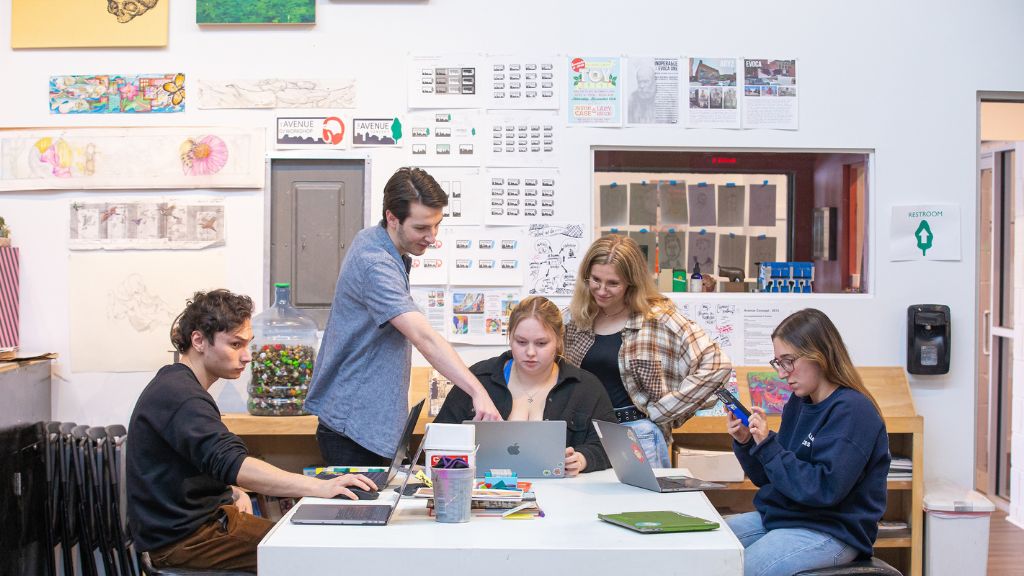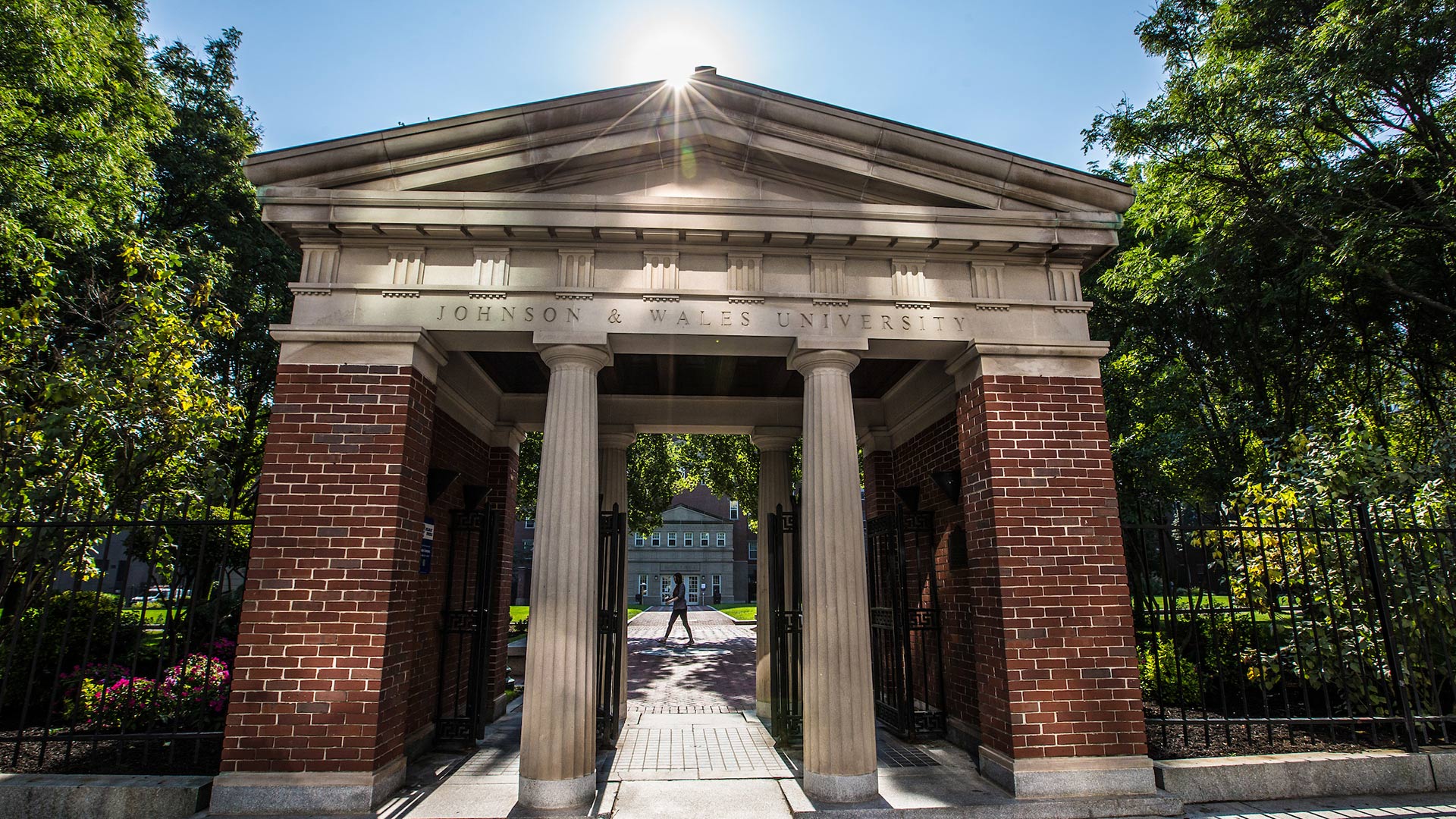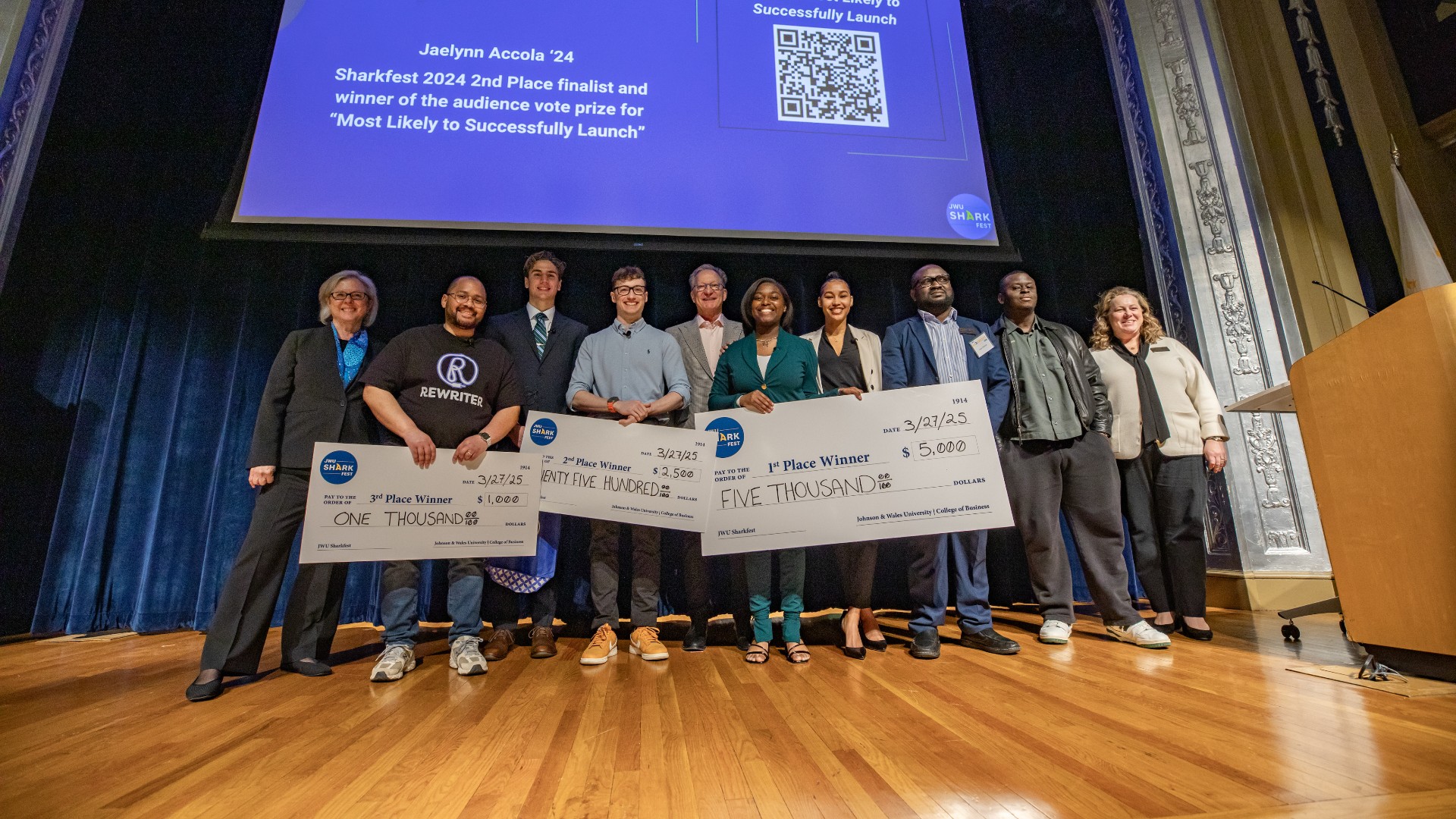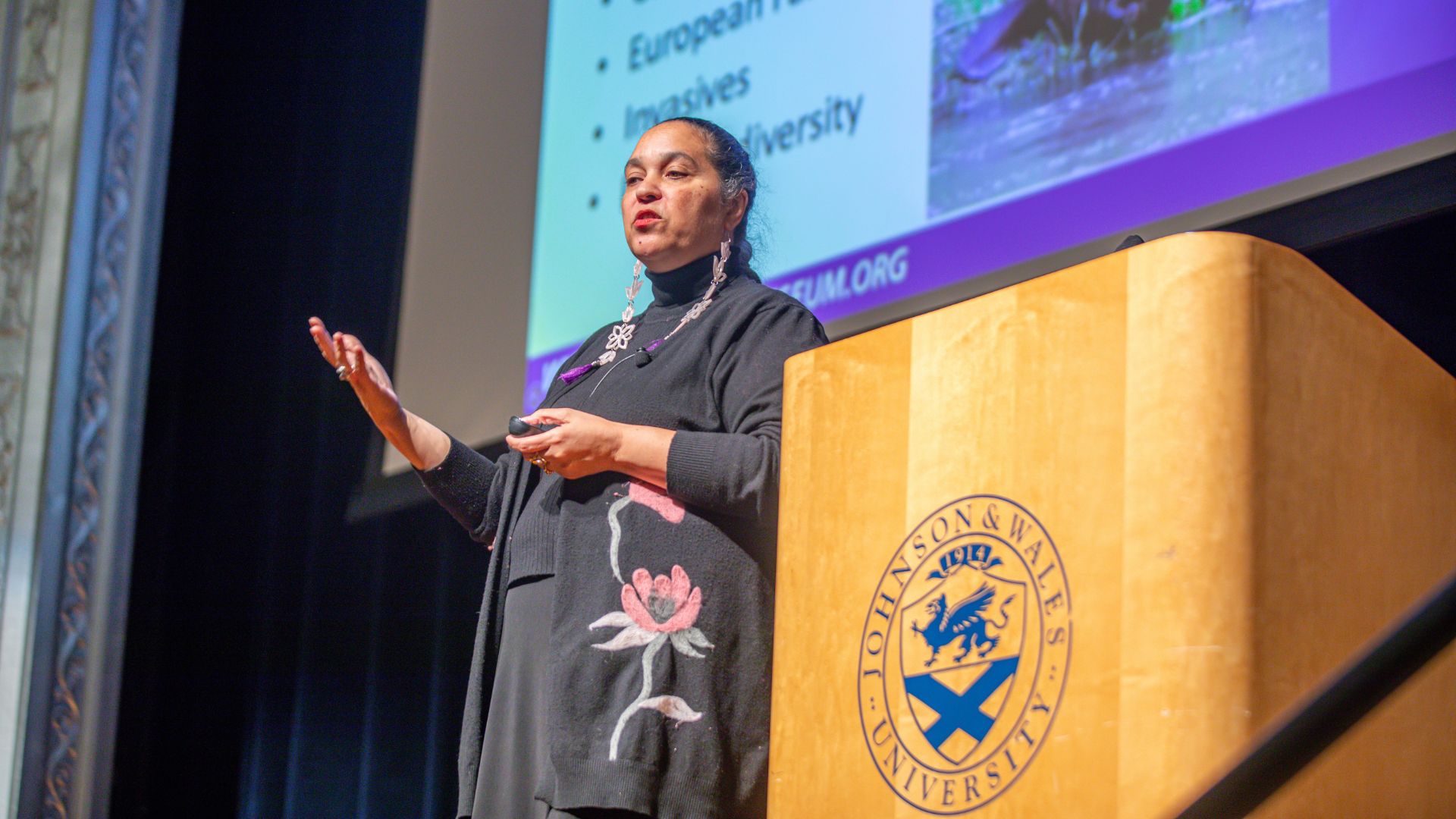How Group Projects Prepare You for the Workplace
Author Audrey Soemarno '27 is a Media & Communication major and works as a student assistant at JWU, contributing to JWU News.
Collaboration and teamwork are two important skills to employers, and by getting experience in working with others in coursework and experiential opportunities, Johnson & Wales University students can practice professionalism, mutual respect and communication.
One of the best ways to gain practical group work experience is to join a Directed Experiential Education (DEE) course. Alumni who come to speak with students always talk about these classes and their benefits. These classes are designed so students experience an authentic working environment, usually with a local business in the client role. I recently talked to a few professors who teach these courses to get their insights on the importance of working with other people, especially how valuable this skill is for the workforce.
JWU ADTEAM: Serving Clients Collaboratively
Instructor Oscar Chilabato has been the faculty member overseeing JWU’s advertising team for many years. ADTEAM, which is part of the American Advertising Federation, gives students the opportunity to compete in the National Student Advertising Competition by developing a comprehensive advertising campaign mirroring a full-service agency's process for major brands. This year, students are working on an advertising campaign for AT&T.
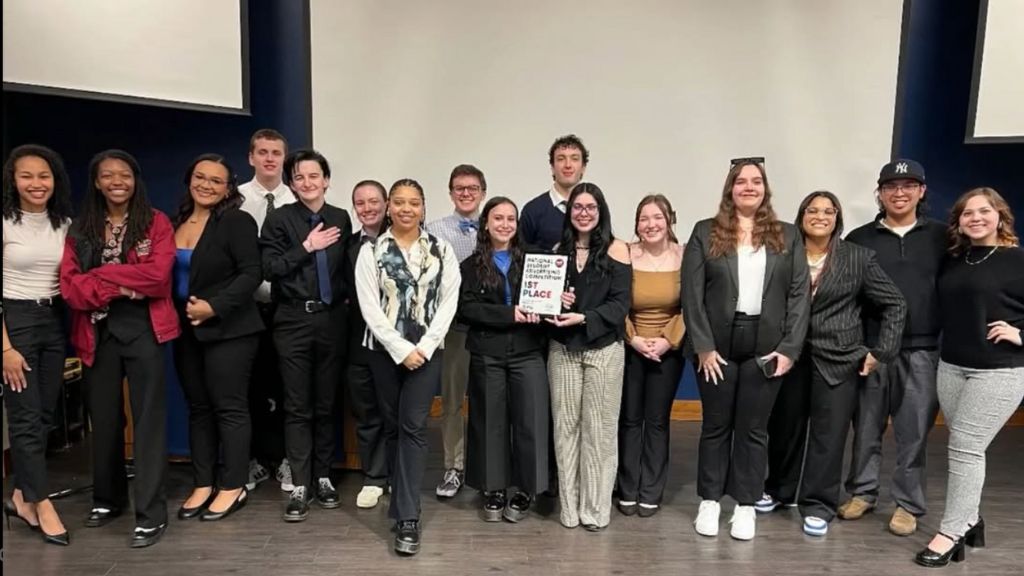
“The group project dynamic was put into place so that it is similar to the real world,” said Chilabato. “People have different values. It's all about learning how to connect with people. And I've had instances with students where they tell me, 'Well, I can't communicate with them because we have nothing in common.' I don't believe that for a second. There is something that everybody has in common with somebody else. It's just about trying to find that common ground.”
“I use the example of when someone suggests or shares an idea in a group. Instead of saying ‘Oh, but that's not a good idea,’ saying the negative first, say, ‘That's good idea and maybe we can do this.’ The difference is one small word,” he expanded.
Honing Business Communication Skills in Class
Associate Professor Joan Geller, who teaches communication courses at JWU Charlotte, believes that group work plays a vital role in helping students strengthen their interpersonal and soft skills, which are essential for success in the professional world.
“Most work these days is team-based,” she explained, “So if our job is to prepare our students for the workplace, it’s really imperative they know how to work as part of a team.” She emphasized that teamwork in college gives students the opportunity to practice essential communication skills like speaking, listening and resolving conflict before they’re required to use them in a real-world setting.
She shared that group work not only helps students grow as professionals but also challenges them to influence others even when they’re not in a leadership role: “It’s good to teach students how to influence others even if they’re not the manager — how do you get someone to come around to your point of view without creating conflict?” She also noted that learning to navigate tricky social dynamics, such as dealing with a friend who isn’t pulling their weight in a group, mirrors real-life workplace challenge.
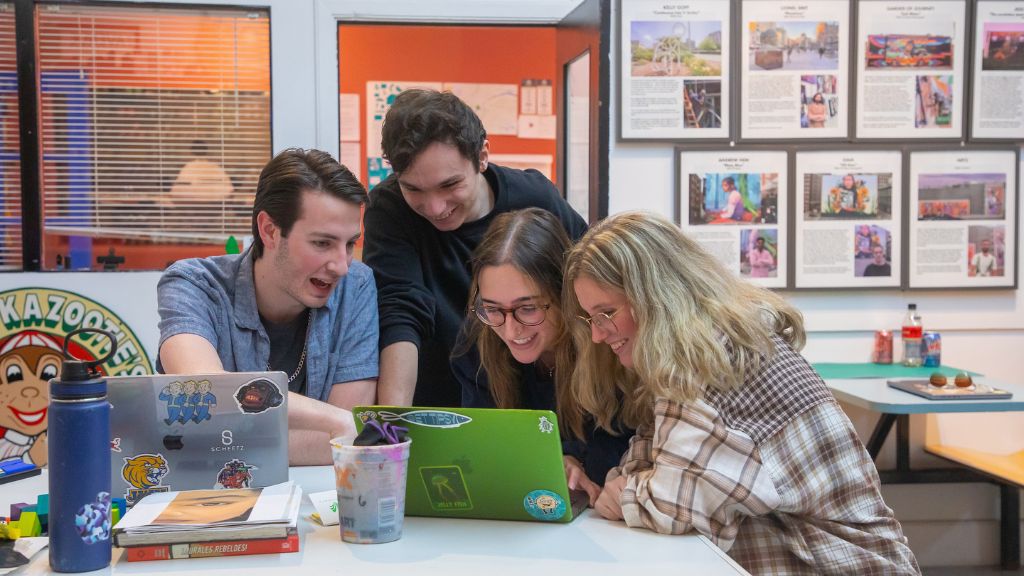
In her own classroom, Geller actively incorporates teamwork by beginning every class with a group activity, with rotating student groups leading the first 10– 15 minutes. “I practice what I preach,” she said with a smile. Over the years, she’s witnessed students build lasting friendships through collaborative assignments — a bond that often extends beyond the classroom. When students face issues in group activities her advice is to approach challenges with a growth mindset: “Sometimes you just have to say, ‘Wow. What can I learn from this person? What is it triggering in me?’” She encourages students to reflect on their struggles as learning moments.
For those having difficulty she suggests talking to the professor and being proactive about finding solutions. She hopes that regardless of whether the group experience was smooth or difficult, students would be able to walk away with communication skills, improved presentation abilities and a better understanding of how to relate to others. “My goal is always for them to learn a great deal and to have fun doing it,” Geller stated. Her insights shine through what many of her students have shared: that communication classes like hers are often the most valuable in preparing them for internships and careers.
Chef David Petrone: Emphasis on Culinary Teamwork
Chef David Petrone, a culinary instructor, stressed the importance of teamwork and collaboration in the food industry, calling it essential in the culinary world. “To me, it’s survival,” he stated, emphasizing that in a fast-paced environment like a kitchen success is rarely achieved alone; it’s all about survival and shared responsibility. Drawing from his own personal experience in restaurant ownership and decades of teaching, he relates teamwork to sports by conveying that you're only as strong as your weakest link. Even students with individual roles must learn to function as a cohesive group.
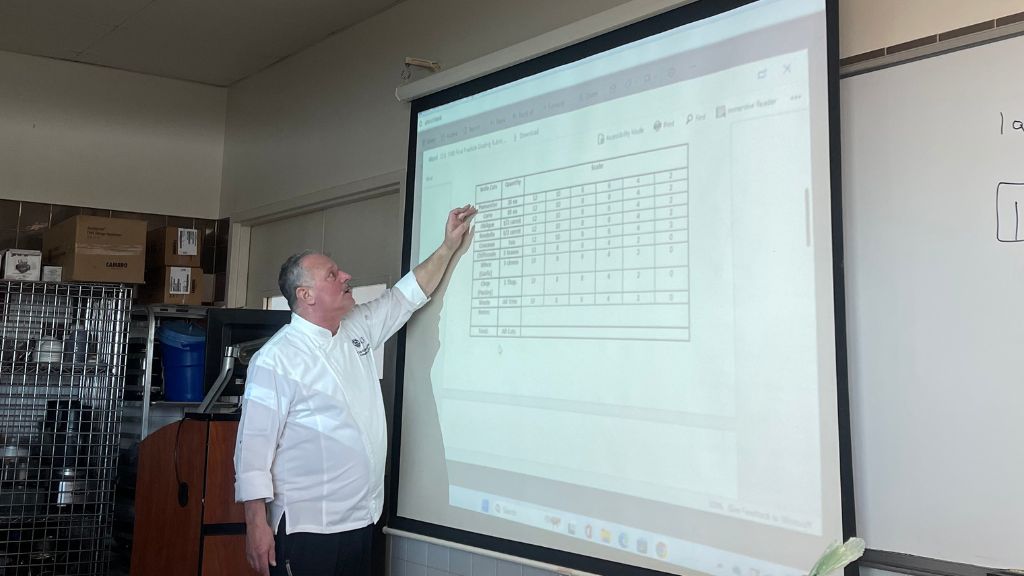
Petrone integrates this mindset into his teaching by emphasizing foundational teamwork concepts in his introductory course then reinforcing them with group-based projects in more of his advanced classes. Students are required to create menus, standardize recipes and manage sanitation all while working as a team. He intentionally steps back during their leadership days to allow them to take full control and accountability to help them prepare for real-world challenges.
He encourages students to identify their weaknesses and lean on team members who may have different strengths, noting, “If you can honestly identify what your weaknesses are, they’re only going to get stronger at some point because somebody’s going to help you or you’re going to reach out and ask for help.” Petrone also highlights the value of diverse strengths within a team.
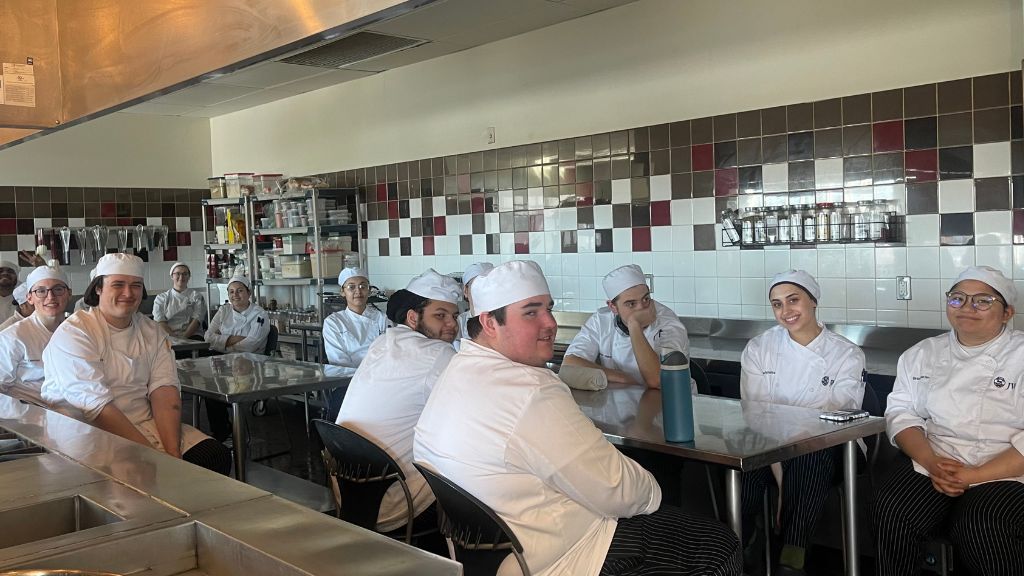
He also openly acknowledges his own weaknesses, such as writing, to help encourage students to identify and grow in their weaker areas through collaboration and seeking help.This openness builds a culture of learning and mutual respect. He stresses the reality of business in the food industry saying, “You must create what others want, not just what you like.” While he jokes that his favorite food is “whatever makes money” or “whatever someone else cooks,” it reflects as crucial mindset for industry success.
Through adapting to generational shifts Petrone continues to mentor students not just academically but professionally in preparing them for job interviews, the realities in the kitchen and life beyond school. “The key to a successful team is making sure that the variety of personalities can all cohesively work with each other,” he noted (or notes, I can’t tell which tense you are going to pick).
JWU Design Team: Collaborative Experiential Education
Associate Professor Deana Marzocchi emphasizes that teamwork and collaboration are not just used for assignments in the classroom. It is a crucial experience that mimics what students will face in their careers, especially in creative fields like design. She believes group projects are essential because they help students develop real-world skills by working with different personalities and adapting to unexpected situations. “It really does mimic industry experience,” she explained, adding that working with others can help students grow into leaders or strengthen their performance through support from teammates.
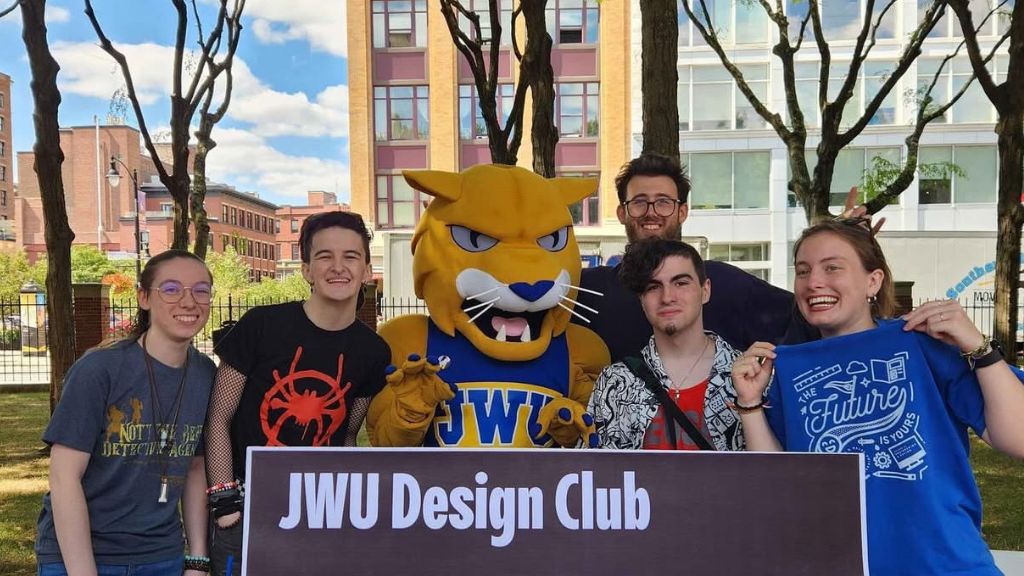
Students should approach team projects with the mindset, “I want to be the best teammate I can be.” Even if students have had bad group experiences in the past, Marzocchi encourages them to stay positive and open-minded, reminding them that they shouldn’t let one negative experience shape their entire outlook. She urged students to be patient with others and seek guidance when needed, saying, “try to have faith in that person” and advising students to recognize that someone who may not be contributing might be going through something personal.
One of the best examples of teamwork in action is JWU’s Design Team, which Marzocchi describes as “basically one giant DEE.” In this project-based experience students are placed into groups based on their skill sets and work on real client projects for both internal and external organizations. “They really are their own little mini design groups,” she explains. The students take ownership of the entire design process from client meetings and brainstorming to the final execution. These projects not only build technical skills but also teach professional habits and soft skills such as communication, leadership and flexibility.
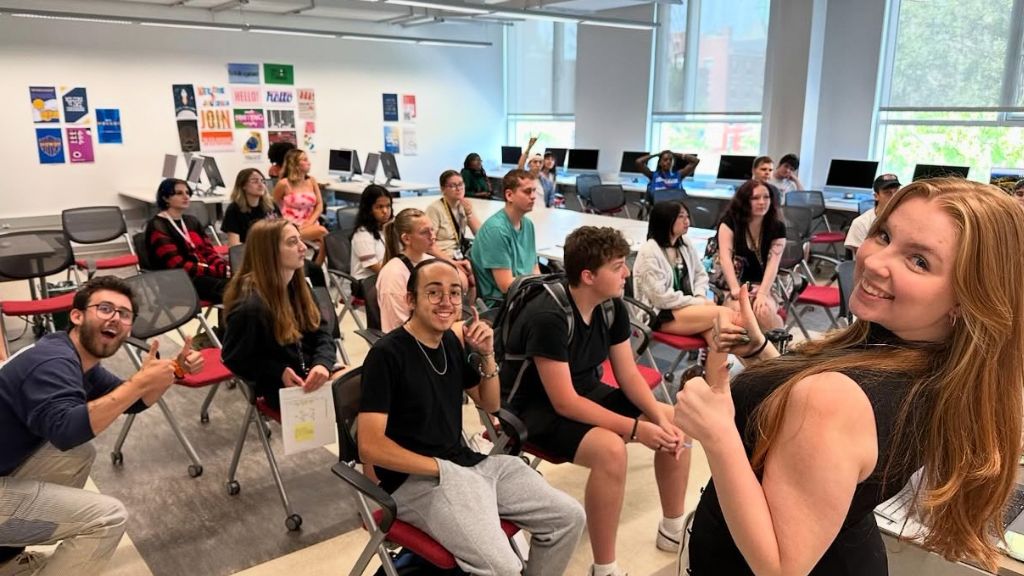
She believes that these experiences are invaluable because they simulate the exact type of collaboration required in the workplace. “You're not going to be isolated,” she says. “Even if you do freelance work, you have to work with clients — and life is about those relationships.” By the end of the project, students often walk away with a deeper understanding of their strengths, learning how to thrive on a team and realizing just how “enriching” collaboration can be when approached with the right mindset.
How Julia Shiels Carried Groupwork at JWU into Her Career
Graphic Design alum Julia Shiels ’24 participated in the Design Team. “During the semester, we’d work with these clients to design various deliverables that fit their needs,” Shiels explained. “Prior to this class, all work had been independent. Designing with others taught me crucial skills for working in the real world. I learned how to delegate tasks to meet deadlines and, more importantly, I learned when to step back and let someone with a specific skill set handle a task or when to speak up and take the lead.”
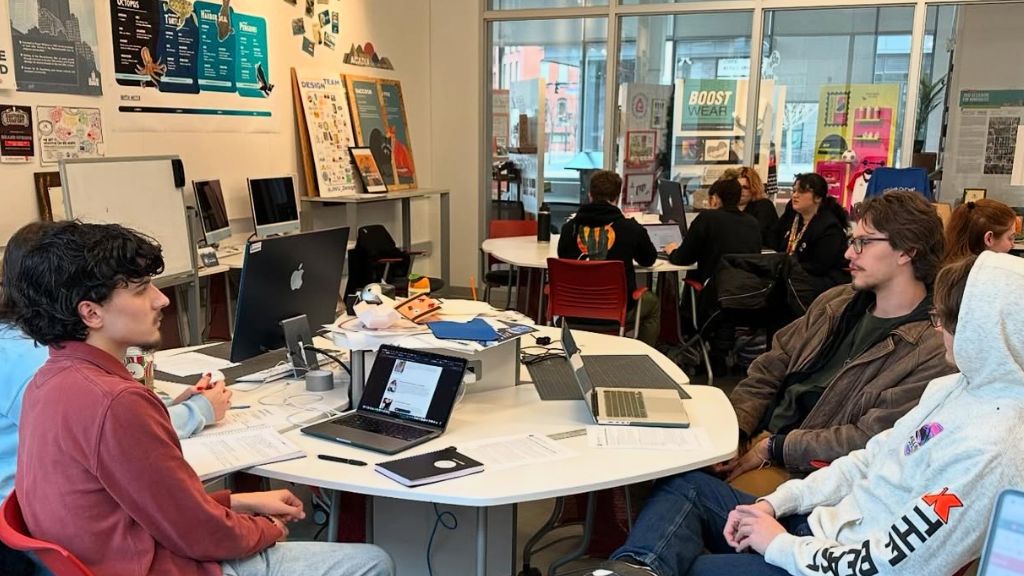
She now works as an associate designer for Newell Brands. “In this position, I am always working in a team. This team, however, consists of not only designers but copywriters and brand team members. We all work together with our various skill sets to complete a project. Because of my time at JWU, I know how to manage my time to get other team members the things they need on time.”
How Miranda Hasani ’25 Applies Group Work to Events
Miranda Hasani is a Sports, Entertainment, Event – Management (SEEM) major graduating this May. She states, “I have had amazing experiences working with others and bad experiences working with others. However, this is part of the learning process and has shown me that I need to anticipate my next steps, and that I have the power of knowing how to react to bad situations. I think I have also learned the value of commending my teammates that are doing well at something — because at the end of the day, if your team is doing well, this translates to you doing well, too.”
Miranda gained valuable experience through multiple DEE courses, including producing a long-form video for Rhode Island Month’s Tech10 Awards, managing social media for the SEEM Leadership Conference and leading concert production as a co-general manager. These experiences have strengthened her leadership, teamwork and problem-solving skills while deepening her passion for music and live event production.
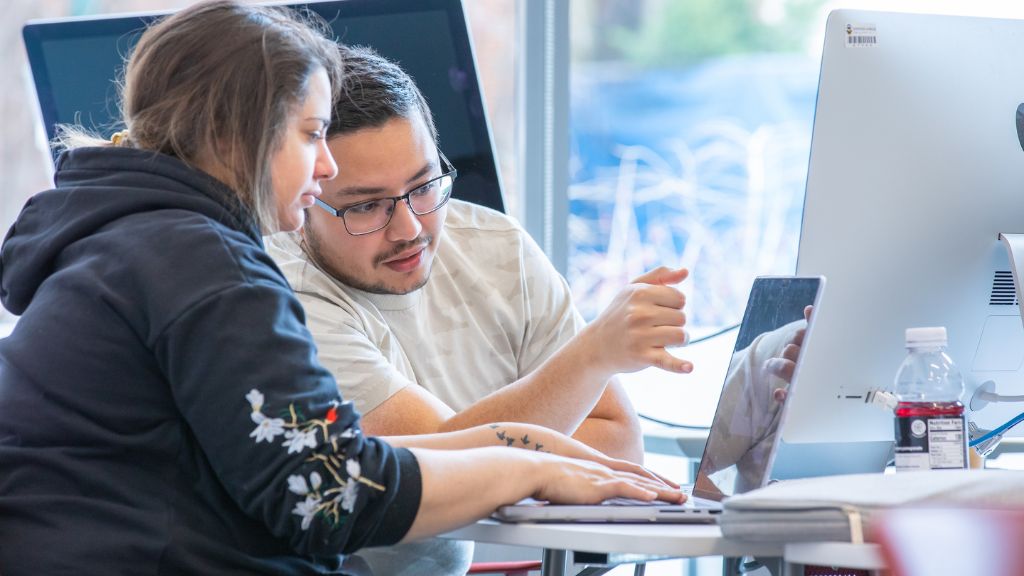
She advises, "One of my tips is to remember that problems are temporary and that they can be solved, no matter how difficult, so you should be the person actively trying to find solutions. Another tip is to be an active listener and take a step back from controlling a conversation if you find yourself doing that. I also strongly recommend valuing your team members and whatever capacity they serve the team. People like to feel seen and heard, and doing this allows for a sense of trust to be built within a team.”
How Cara Martino ’26 Finds Group Work Essential for Success
Cara Martino ’26, who is a Hospitality Management major at JWU Charlotte, believes that group projects are essential to student success both in and beyond college. “Group projects and working together with other individuals prepares us for our future careers.” She emphasizes that nearly every career requires teamwork, and practicing collaboration in college is a stepping stone to future workplace success, giving students an early opportunity to develop communication, problem-solving and time management skills.
Reflecting on her own experience, she notes that while group projects can come with challenges they often lead to growth and valuable lessons. One key takeaway for her is the importance of accountability: “You may have a lot going on in your life, but so do your group members.” She shares that success comes from strong communication and responsibility among teammates.
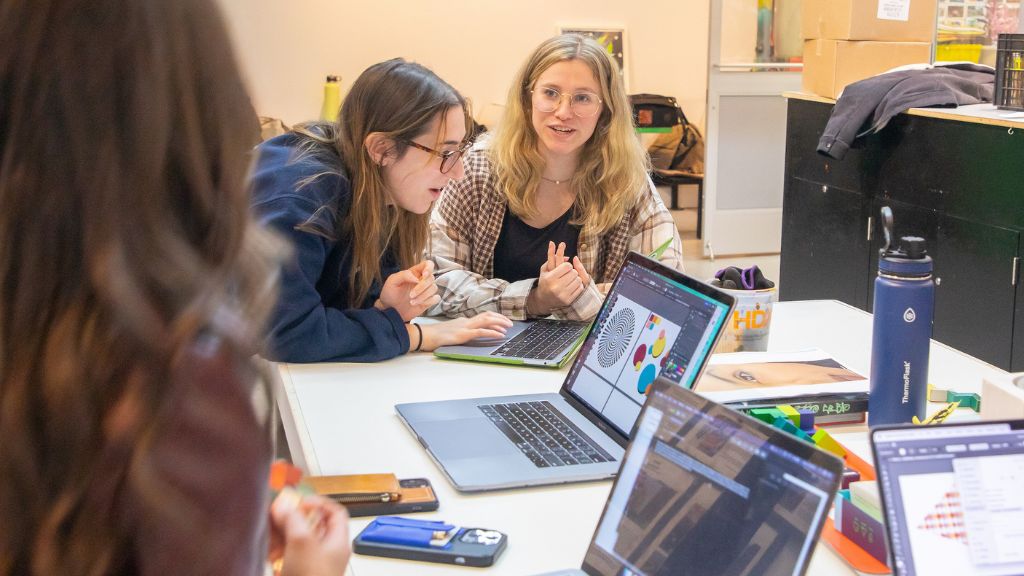
Cara also believes that working with others during college through clubs and programs has been equally impactful. Being involved in organizations like Family, Career and Community Leaders of America (FCCLA), Club Managment Assocation of America (CMAA), and Student Government Assocation (SGA) has taught her different leadership and teamwork skills. For students struggling in group settings, her advice is simple but powerful: “Be patient and be open to ideas different from your own.” These experiences both in class and in extracurriculars have shaped her belief that collaboration is a critical aspect for one’s future.
Collaboration opportunities provide more than just academic benefits; they prepare students for life beyond the classroom. Whether through DEE courses, group projects or extracurricular involvement, students learn to navigate the complexities of teamwork to better set themselves up for success in many types of careers.
